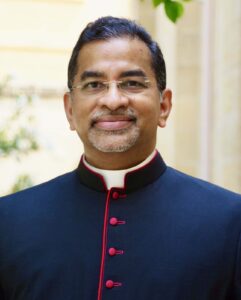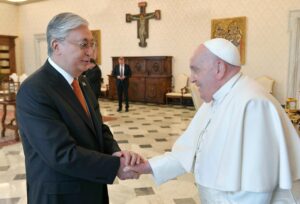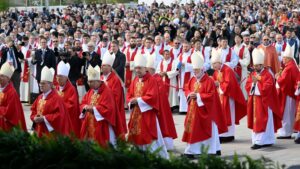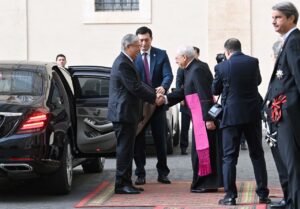ASTANA – The course of events on Kazakhstan’s diplomatic front in 2024 unfolded with President Kassym-Jomart Tokayev’s first official visits to Italy and the Vatican. Kazakhstan-Vatican relations are poised to advance with a shared commitment to interreligious dialogue – a theme dear to both sides, said Apostolic Nuncio to Kazakhstan Archbishop George Panamthundil in an interview with The Astana Times.
The urgent commitment to promote peace and stability amid conflicts and humanitarian crises took center stage in the discussions of President Tokayev and Pope Francis during their meeting on Jan. 19 in the Vatican.

George Panamthundil.
From the nuncio’s perspective, His Holiness’s audience with the Kazakh leader once again highlighted the intention of the two countries to promote collaboration and underscored the importance of stepping up an open dialogue on the international stage.
“Global challenges need global leaders to meet, talk, and act in favor of peace and stability in the world. That is what President Tokayev and Pope Francis did. For example, the ‘third world war in pieces,’ as Pope Francis usually says, and the climate change can’t be addressed by isolated actors,” said the archbishop.
“The two leaders clearly indicated that these problems can’t be resolved from a myopic perspective, confined by temporal, spatial, or self-centric limitations,” he noted.
Thirty-two years have passed since the establishment of diplomatic relations between the Holy See and Kazakhstan on Oct. 17, 1992. Among the countries of the Commonwealth of Independent States (CIS), Kazakhstan was the first to sign an agreement on mutual relations with the Vatican back in 1998. President Tokayev, at that time Kazakh Foreign Minister, signed the document himself. Last year marked its 25th anniversary.

President Tokayev and Pope Francis during the Jan. 19 meeting. The Holy See Press Office statement described the discussions as “cordial.” Photo credit: Akorda.
“It is deeply true that our relations already have a history to remember and to rely on. The dynamics of our cooperation is underpinned by a mutual recognition and trust, common aspirations for the well-being of people of Kazakhstan and humanity at large,” said Panamthundil.
The apostolic nuncio mentioned the signing of a supplementary agreement between Kazakhstan and the Holy See in the Kazakh capital on Sept.14, 2022. The agreement facilitates the acquisition of a stay permit in Kazakhstan by pastoral workers.
“This agreement confirms Kazakhstan’s commitment to issuing permanent residence permits to foreign catholic priests and nuns assigned for long-term service. In turn, the Catholic Church is committed to work tirelessly for the common good and to help each believer to be an ‘adal azamat’ [an honorable citizen in Kazakh]. All social projects the Catholic Church is undertaking throughout the country contribute to building a better present and future for the needy,” he said.
Apart from interreligious dialogue, Panamthundil underscored the importance of cooperation in medicine and historical and archival research, which is outlined in respective memorandums of understanding between Kazakhstan and the Vatican.
Pope Francis’ visit to Astana in September 2022 became a large-scale event for the entire Central Asian region. As part of the 38th apostolic journey, he conducted a holy mass for nearly 10,000 people. He also participated in the seventh Congress of Leaders of World and Traditional Religions, a permanent international interfaith institution for the dialogue of religions launched on Kazakhstan’s initiative in 2003.

On Sept. 14, 2022, Pope Francis held an open-air holy mass for thousands of Catholic believers, including pilgrims. Photo credit: vaticannews.va.
“Kazakhstan recognizes the importance of this endeavor and is earnestly committed to its furtherance. Similarly, the Holy See is eager to make a meaningful contribution to this initiative,” he said, referring to the platform.
Religions, according to the apostolic nuncio, play a fundamental role in the promotion of peace and understanding between peoples and countries.
“The quintessential instrument for each constructive process is a dialogue. As Pope Francis says, only in an open dialogue, we can understand intentions and concerns, even the sufferings in the heart of the other,” he said.
The congress provides a venue for religious leaders to share visions and listen to each other. It is aimed to showcase the peacemaking potential of religions as contributors to global stability.
“As it was mentioned by President Tokayev, we need a regular and trust-based dialogue at the highest level to develop relations between the countries. The preparatory events between the congresses include meetings, visits, and interactions, where each one tries to understand the partner in a dialogue,” he said.

As part of his visit to the Holy See, President Tokayev also met with the Vatican Secretary of State, Cardinal Pietro Parolin, accompanied by the Vatican Secretary for Relations with States and International Organizations, Archbishop Paul Richard Gallagher. Photo credit: Akorda.
In January, the archbishop visited Almaty to meet with Metropolitan Alexander Mogilev of Astana and Kazakhstan. This year marks the 25th anniversary of the establishment of the Orthodox diocese of Astana and Almaty.
“I visited the beautiful Ascension Cathedral [a Russian Orthodox cathedral in Almaty’s Panfilov Park]. His Excellency Jose Luis Mumbiela Sierra, the bishop of the Catholic Diocese of the Holy Trinity in Almaty and the president of the Catholic Bishops’ Conference of Central Asia, was also present at the meeting. The warmhearted meeting took place on a providential date – from Jan. 18 to 25 of each year the Week of Prayer for Christian Unity is celebrated, and this year the theme was taken from the Gospel – love the Lord your God… and your neighbor as yourself,” he said.
